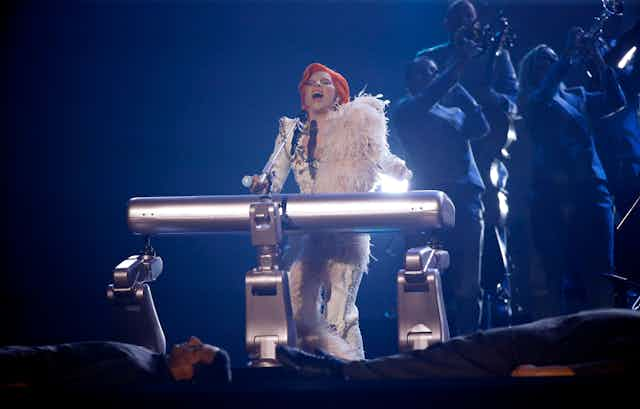On January 10, 2016, I received a text message from a friend who is a devoted David Bowie fan: “There was an Internet death hoax about Bowie. I’m still shaking,” she exclaimed. Hesitantly, she decided,
There’s no official news as yet, so I think it’s safe to assume that it is fake.
Her skepticism was warranted, given that Bowie had only two days prior released his 25th – and what would become his final – studio album, Blackstar.
But of course, the reports were not fake. The news spread like wild fire as headlines across the globe announced the death of an icon. Blackstar would be his parting gift to his fans and to the world of pop that he himself had helped to shape.
Not surprisingly, an outpouring of grief ensued. Bowie-themed nights and tributes began to flow, but the most talked-about homages were the recent performances by Lady Gaga at the Grammy Awards and Lorde at the BRIT Awards.
These two performances were polar opposites. Gaga’s tribute showcased a medley of songs, the singer whizzing through many of Bowie’s classics – Suffragette City, Changes, Ziggy Stardust, Rebel Rebel, Fame, Let’s Dance to name a few – at lightning-bolt speed.
The performance – complete with brass section, a dancing robotic electric piano, and references to Bowie’s famous alter egos, Aladdin Sane and Ziggy Stardust – contained all the glitz and glamour one would expect to find at a Grammy Awards performance.
Lorde’s tribute, on the other hand, was much more pared back. Devoid of stage props and Bowie-esque makeup, the singer - alongside Bowie’s band - delivered a haunting rendition of Life on Mars.
Lorde and Lady Gaga have since been pitted against each other, as commentators, fans, and music critics compare the two performances. Many concluded that Lorde’s was the better, more fitting, and more appropriate tribute. The most frustrating aspect of this comparison, however, is the way in which Lady Gaga’s performance was derided.
Gaga’s tribute was denounced for being “over-the-top”, “too superficial”, “too theatrical” and “too strenuously pop”. Bowie’s son, Duncan Jones, tweeted a veiled criticism after Gaga’s performance:
Lorde’s performance was, by contrast, described as “subtle”, “real” and “powerful” and was thus celebrated for being more “authentic”.
This commentary spoke volumes about who is deemed worthy of paying tribute to an artist such as Bowie. At the core of the Lady Gaga-vs-Lorde debate is the ideology of authenticity, which is deeply embedded in rock-music discourse.

This ideology situates rock and pop music in opposition to each other: rock is supposedly real, authentic, sincere, and honest, while pop music is supposedly banal, artificial, contrived and vapid. By this understanding, rock is thus viewed as superior to pop.
How can Gaga, a supposedly inauthentic, vapid, and contrived pop star, possibly pay homage to such an authentic and real artist like Bowie? Lorde is deemed more worthy of such a tribute because, in spite of her pop identity, she embodies the ideology of authenticity.

Part of what made Bowie such a great contributor to both pop music and pop culture was his ability to be artificial as well as real, to be theatrical whilst being honest, to be contrived and authentic.
The Lady Gaga-vs-Lorde debate is therefore both unproductive and arbitrary. Both performances showcased a different side to Bowie’s artistry: Gaga’s tribute focused on his performative and theatrical side, highlighting in particular his fascination with technology, artifice, and fantasy worlds (Labyrinth immediately comes to mind).
By stripping these things back, Lorde’s tribute celebrated Bowie’s musicality, highlighting instead his songwriting ability through a predominantly musical performance of one of his greatest songs: Life on Mars.
Both of these tributes captured the essence of Bowie. When considered together, rather than being pitted against each other, they can be seen as capturing what quintessentially made him a truly enigmatic and unique artist.

